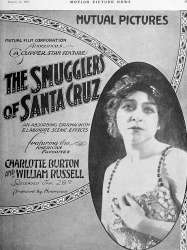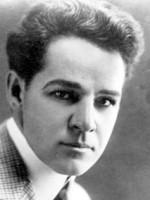Looking Forward is a american film with Frank Hall Crane
Looking Forward (1910)

If you like this film, let us know!
OriginUSA
Looking Forward is a 1910 American silent short drama produced by the Thanhouser Company. Adapted from James Oliver Curwood's short story of the same name, the film follows a young chemist named Jack Goodwin. He discovers a chemical compound that puts a person into a state of sleep for a determined period of time and decides to test it upon himself. The first test is a success and Jack makes arrangements for his sleep of a hundred years, in a state similar to suspended animation. When he awakes in 2010 into a world ruled by women, he woos the female mayor. Jack joins a society to campaign for men's rights. The society ends up before the female mayor who jails all of them, save for Jack who she proposes to. Jack accepts on the condition that men are given back their rights and she accepts. The cast and production credits of the film are not known, but Theodore Marston was not the director. The film was released on December 20, 1910. The film is presumed lost.
Synopsis
The film focuses on Jack Goodwin, a young chemistry student who has discovered a novel compound that allows a person to be put in a state of sleep for any length of time. The compound causes an effect similar to suspended animation, with no ill-effects or bodily changes. Jack tests the compound on himself for a period of a week and desires to test it for a century. In preparation for this, he obtains a safety deposit vault and provides instructions to be presented before the mayor in a hundred years. Jack's experiment works and he awakes in the year 2010 to a very different future. Transportation has been radically changed to pneumatic tubes allowing him to be transported to the mayor. The woman mayor takes an interest in him and invites her over to her home. In the intervening years, the world has become ruled by women and Jack is now out of place, but the two fall in love. Her father is an advocate for men's rights and Jack joins their society. The group soon appears before the mayor and she sends all of them to jail through the pneumatic tube, except for Jack. She proposes to him, but Jack only consents if the rights of men would be granted. The mayor is true to her word and signs a decree to give the men their liberty. During the ceremony, she attempts to lead Jack to the altar, but Jack shows her that the man must lead. When the bridal veil is placed on Jack, he places it on his new wife.Actors
Comments
Leave comment :
Suggestions of similar film to Looking Forward
There are 91 films with the same actors, to have finally 70 suggestions of similar films.If you liked Looking Forward, you will probably like those similar films :

John Halifax, Gentleman (1910)
Origin USA
Actors Martin Faust, Frank Hall Crane, William Russell, Violet Heming
Though the film is presumed lost, a synopsis survives in The Moving Picture World from December 3, 1910. It states: "John Halifax, an orphan, trudges to town to make his fortune. There he is befriended first by Ursula March, the daughter of the richest man in town, who gives him food, and later by Abel Fletcher, a rich Quaker. Fletcher's invalid son takes a great fancy to John, and through his influence John is employed in his father's mill. After five years of faithful work, John has risen to the position of foreman. He and Fletcher's son, Phineas, had become fast friends. Against the wishes of his father, Phineas persuades John to take him to a theatre. The trip proves too much for the invalid, and John carries him home from the theatre in a fainting condition. Fletcher is furious with John, and drives him from the house. About this time there is a great discontent at the mill, among the workmen. Fletcher decides to close it down. After six weeks of starvation, the workmen and their families come in a crowd to the mill and demand that they be given the grain which is stored there. Rather than accede to their demands, Fletcher hurls the bags of grain into the river. This so infuriates the mob that they try to set fire to the mill and put an end to Fletcher. Unable to control the mob, John helps Fletcher, his son and Ursula, to escape. Finally he wins Fletcher's consent to compromise with the men. Realizing that he owes his property and life to John, Fletcher asks his forgiveness for his former harsh treatment. John becomes Fletcher's adopted son and wins Ursula for his bride.

Looking Forward (1910)
Directed by Theodore Marston
Origin USA
Themes Théâtre, Comedy science fiction films, Films based on plays
Actors Frank Hall Crane, William Russell

The Craving (1916)
Origin USA
Actors William Russell, Charlotte Burton, Hellene M Rosson, Roy Stewart, Rae Berger

The Highest Bid (1916)
Directed by William Russell
Origin USA
Actors Charlotte Burton, William S. Hooser, Harry Keenan, Marie Van Tassell, William Russell

The Love Hermit (1916)
Origin USA
Actors William Russell, Charlotte Burton, William Stowell, Ethel Rosson, Ashton Dearholt, Harry von Meter

The Man Who Would Not Die (1916)
, 50minutesDirected by William Russell, Nate Watt
Origin USA
Actors Charlotte Burton, Harry Keenan, William Russell, Leona Hutton
A wealthy young woman, Agnes (played by Burton), is loved by the identical twin brothers Clyde and Ward Kingsley (dual role played by Russell). She marries Clyde and he immediately begins squandering her fortune. When the money is almost gone, Clyde comes up with a plan to collect on his life insurance policy. As his brother, Ward, who still loves Agnes, is terminally ill, he persuades him to take his place so the insurance company will believe that Clyde has died instead of Ward.

The Smugglers of Santa Cruz (1916)
Directed by Donald MacDonald
Origin USA
Genres Drama
Actors Charlotte Burton, Eugenie Forde, George Periolat, William Russell, Roy Stewart, Roy Stewart

Directed by William Russell
Origin USA
Actors William Russell, Charlotte Burton, Nell Franzen, Harry Keenan, Marguerite Nichols

The Thoroughbred (1916)
Origin USA
Actors Charlotte Burton, William Russell, Roy Stewart, Lizette Thorne
 Connection
Connection


